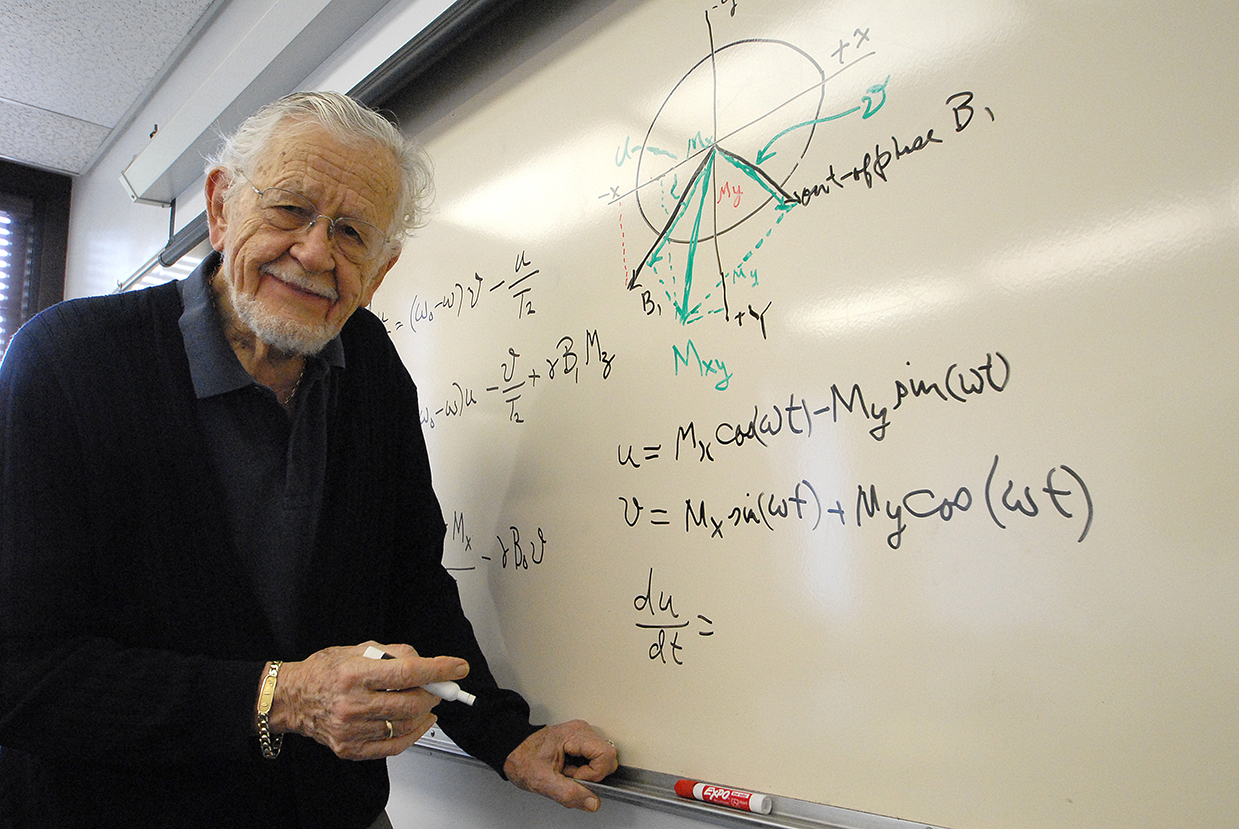 Jack Roberts fell in love with science at Caltech.
Jack Roberts fell in love with science at Caltech.
As a teen, the Los Angeles native relished attending community open-house sessions on campus. He would marvel at the shooting sparks in a high-voltage laboratory or at rare reactions in the chemistry labs.
Thus began an academic journey that took him to UCLA, Harvard, MIT, and, eventually, back to Caltech. In 1953, he demonstrated the existence of an unstable compound called benzyne with a pattern of atomic bonds previously thought impossible. That same year, his abiding love of science carried him back to Pasadena for an appointment as professor, beginning a 60-year career that would advance both chemistry and Caltech.
“For my father, Caltech was life,” says Jack’s son Allen Roberts. “Caltech was like family to him and my mom.”
A pioneer in organic chemistry, Jack saw the possibilities in new or obscure ideas and then used or explained them in ways that moved those ideas into the scientific mainstream.
A prime example is his work with nuclear magnetic resonance (NMR) spectroscopy—originally a tool for physicists. On Jack’s initiative, Caltech became the first university in the United States to buy an NMR machine. He used it to plumb the structure of molecules, opening it up to adoption by chemists everywhere. (Readers may be familiar with NMR’s offspring, the MRI scanner.)
Jack similarly popularized the use of radioactive isotopes to trace the course of reactions and elucidated a fundamental concept of chemistry called molecular orbital theory. He also co-wrote the influential textbook Basic Principles of Organic Chemistry. Among the many honors he earned were the National Medal of Science, the Priestley Medal, and—most meaningful to him personally—the American Chemical Society Award in Pure Chemistry.
Named Caltech’s Institute Professor of Chemistry in 1972, Jack served the Institute in many capacities, including terms as chair of the Division of Chemistry and Chemical Engineering and as vice president, provost, and dean of faculty. He is remembered as passionate in his devotion to teaching, uncompromising in his insistence on excellence, and resolute in his caring for and encouragement of young scientists and engineers. He mentored generations of Caltech scholars—postdoctoral, graduate, and undergraduate alike.
One contribution to Caltech culture was a source of particular pride. When he first joined the Institute, he made sure his student Dorothy Semenow could follow him to Caltech, opening up graduate study to women for the first time.
In later years, Jack championed Caltech’s Summer Undergraduate Research Fellowships (SURF) program. He knew the value of undergraduate research firsthand, crediting his own early lab opportunities with s-haping his life. At the end of each summer, he and Edith, his high-school sweetheart and wife, would bring SURFers to the Athenaeum, the ornate Caltech faculty club, for an annual farewell luncheon.
“He always had pictures of his little flock of SURF students from the previous year around the house,” Allen says. “Whenever anybody tried to make summer plans that included my dad, they had to work around the SURF program.”
The same generosity of spirit and dedication to Caltech inspired Jack and Edith to provide endowed funding for SURF. They donated their house with a charitable remainder trust. In addition to tax benefits, Jack and Edith received a regular stream of income.
“It was a fantastic arrangement for everybody involved,” Allen says.
Jack died at age 98 in 2016, preceded by Edith in 2010. Even beyond the SURF endowment they created, their memory and legacy shine on at Caltech. Friends, loved ones, and admirers created a fund in their honor to underwrite the Jack D. and Edith M. Roberts Chemistry Center at Caltech—a place where undergraduates can try their hand at NMR spectrometry.
“I feel the Institute’s been very good to me, and I’ve tried to give it a lot in return.”
—Jack Roberts


